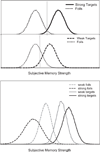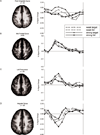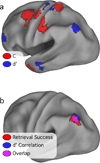A differentiation account of recognition memory: evidence from fMRI
- PMID: 23092213
- PMCID: PMC4075041
- DOI: 10.1162/jocn_a_00292
A differentiation account of recognition memory: evidence from fMRI
Abstract
Differentiation models of recognition memory predict a strength-based mirror effect in the distributions of subjective memory strength. Subjective memory strength should increase for targets and simultaneously decrease for foils following a strongly encoded list compared with a weakly encoded list. An alternative explanation for the strength-based mirror effect is that participants adopt a stricter criterion following a strong list than a weak list. Behavioral experiments support the differentiation account. The purpose of this study was to identify the neural bases for these differences. Encoding strength was manipulated (strong, weak) in a rapid event-related fMRI paradigm. To investigate the effect of retrieval context on foils, foils were presented in test blocks containing strong or weak targets. Imaging analyses identified regions in which activity increased faster for foils tested after a strong list than a weak list. The results are interpreted in support of a differentiation account of memory and are suggestive that the angular gyrus plays a role in evaluating evidence related to the memory decision, even for new items.
Figures






References
-
- Aminoff E, Freeman S, Clewett D, Tipper C, Frithsen A, Johnson A, Grafton S, Miller M. Neural correlates of criterion shifting in memory. Poster presented at the Cognitive Neuroscience Meeting; San Francisco, CA. 2011.
-
- Balota DA, Yap MJ, Cortese MJ, Hutchinson KA, Kessler B, Neely JH, Nelson DL, Simpson GB, Treiman R. The English lexicon project. Behavior Research Methods. 2007;39:445–449. - PubMed
-
- Buckner RL, Wheeler ME. The cognitive neuroscience of remembering. Nat Rev Neurosci. 2001;2:624–634. - PubMed
-
- Buracas GT, Boynton GM. Efficient design of event-related fMRI experiments using M-sequences. Neuroimage. 2002;16:801–813. - PubMed
Publication types
MeSH terms
Grants and funding
LinkOut - more resources
Full Text Sources
Other Literature Sources
Medical

